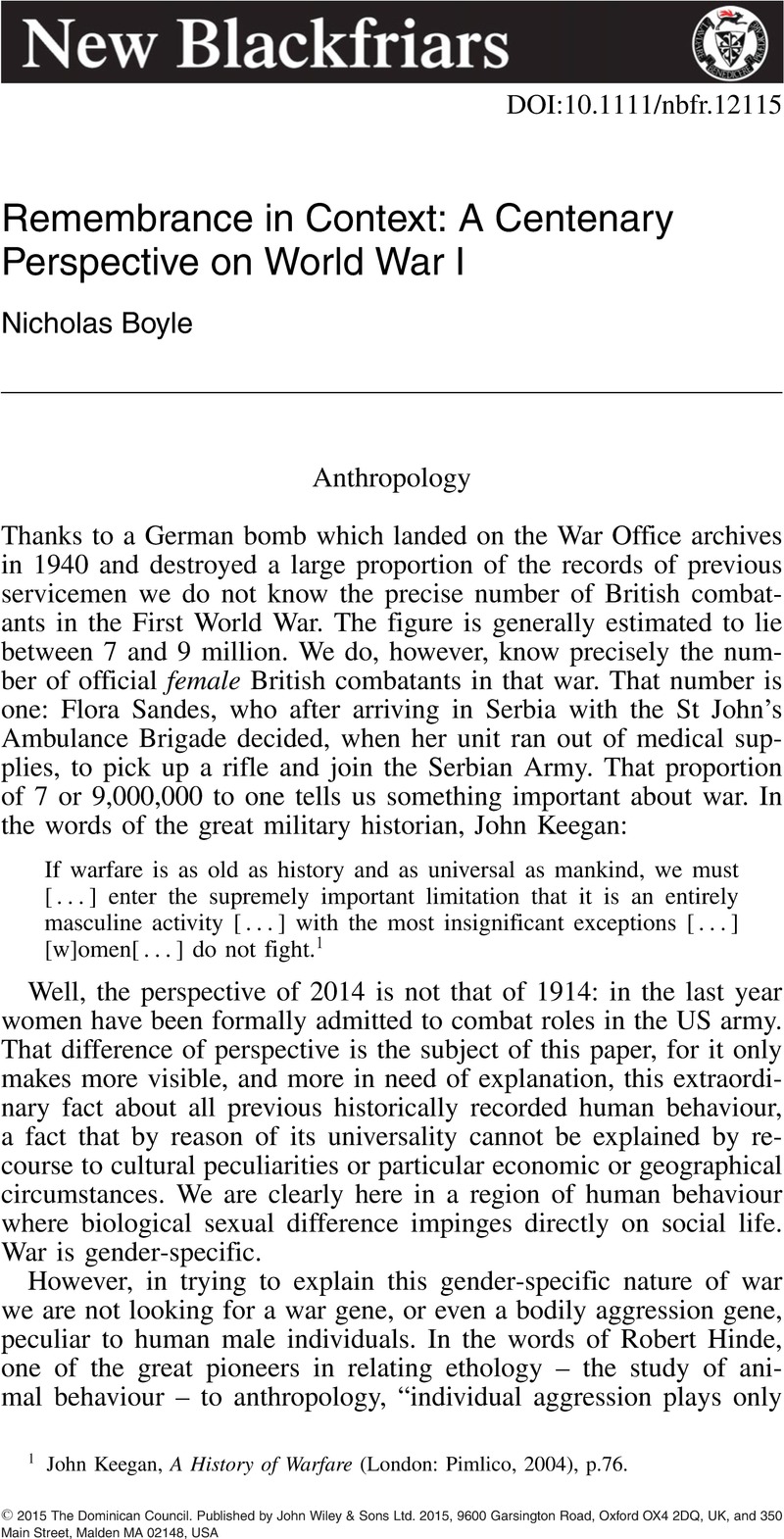No CrossRef data available.
Article contents
Remembrance in Context: A Centenary Perspective on World War I
Published online by Cambridge University Press: 01 January 2024
Abstract

- Type
- Original Article
- Information
- Copyright
- Copyright © 2015 The Dominican Council
References
1 Keegan, John, A History of Warfare (London: Pimlico, 2004), p.76Google Scholar.
2 Hinde, R. A., ‘Aggression and the Institution of War’ in: Hinde, R. A. (ed.), The Institution of War (Basingstoke: Macmillan, 1991), pp.1–12, 6.Google Scholar
3 Harris, Marvin, “A Cultural Materialist Theory of Band and Village Warfare: The Yanomamö Test”, in: Ferguson, R. (ed.), Warfare, Culture, and Environment (New York, London etc.: Academic Press, 1984), pp.111–140, 112Google Scholar.
4 Potts, M. and Short, R.V., Ever since Adam and Eve. The evolution of human sexuality (Cambridge: Cambridge University Press, 1999), p.47Google Scholar.
5 Elias, Norbert, Über den Prozeß der Zivilisation. Soziogenetische und psychogenetische Untersuchungen (Basel: Haus zum Falken, 1939)Google Scholar.
6 Potts and Short, Ever since Adam, pp.31, 47. See also Hinde, R.A., Ethology (Oxford: Oxford University Press, 1982), p.248Google Scholar.
7 Especially Chagnon, N., Yanomamö: The Fierce People (New York: Holt, Rinehart, 1968)Google Scholar.
8 Keegan, History of Warfare, pp.94–8. The Hobbesian connection is stressed by Harris, ‘A Cultural Materialist Theory’, e.g. p.114.
9 Keegan, History of Warfare, p.189, wording adapted.
10 Steven Pinker, The Better Angels of Our Nature (London: Penguin, 2011), p.237.
11 Keegan, History of Warfare, p.97; Pinker, Better Angels, pp.44–46, 53.
12 Pinker, Better Angels, pp.44–48.
13 Keegan, History of Warfare, p.96.
14 Chagnon, Yanomamö, p.75.
15 Pinker, Better Angels, p.236; Keegan, History of Warfare, pp.205, 209, 211.
16 The particular bloodthirstiness of pastoralists is better attributed, as by Keegan, to their familiarity with the process of slaughtering their own flocks (History of Warfare, p.213) than, as by Gellner, to their need to protect their flocks from predators (Ernest Gellner, ‘An Anthropological View of War and Violence’, in: Hinde (ed.), The Institution of War, 62–79, 63).
17 Potts and Short, Ever since Adam, p.35.
18 Quoted Potts and Short, Ever since Adam, p.189.
19 Keegan, History of Warfare, p.119.
20 Betzig, Laura L., Despotism and Differential Reproduction: a Darwinian view of history (New York: Aldine, 1986)Google Scholar.
21 Weber, Max, Wissenschaft als Beruf 1917/1919. Politik als Beruf 1919 (Max Weber Gesamtausgabe I. 17) (Tübingen: Mohr, 1992), pp.158–159Google Scholar.
22 Betzig, Despotism, p.77.
23 Gellner, “An Anthropological View”, p.62–63.
24 Kramer, S.N., The Sumerians. Their history, culture, and character (Chicago: University of Chicago Press, 1963), p.51Google Scholar.
25 Keegan, History of Warfare, pp.114, 130–131, 133–135, 246–252, 267.
26 Pinker, Better Angels, pp.57–67, 62.
27 Pinker, Better Angels, pp.77, 302.
28 Russett, Bruce, “Not All the Nations Furiously Rage Together”, in: Sullivan, Robert E. (ed.), Higher Learning and Catholic Traditions (Notre Dame: University of Notre Dame Press, 2001), pp.61–85, 67–68, 79Google Scholar.
29 Keegan, History of Warfare, p.22.
30 Clarke, Christopher, The Sleepwalkers. How Europe went to war in 1914 (London: Penguin, 2013)Google Scholar.
31 Paul W. Schroeder, “Embedded Counterfactuals and World War I as an Unavoidable War”, available online at www.vlib.us/wwi/resources/archives/texts/t040829a/counter.html
32 Clarke, Sleepwalkers, pp.123, 130, 149, 158–159, 167.
33 Steiner, Zara S. and Neilson, Keith, Britain and the Origins of the First World War (2nd ed.) (Basingstoke: Palgrave Macmillan, 2003), p.32CrossRefGoogle Scholar.
34 Cp. Clarke, Sleepwalkers, p.456.
35 Pinker, Better Angels, pp.827–832.
36 Keegan, History of Warfare, p.193.




